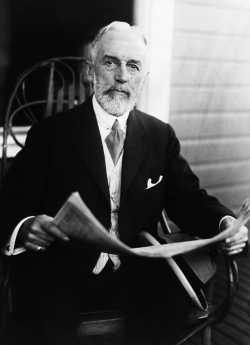Related Topics
Old Age, Re-designed
A grumpy analysis of future trends from a member of the Grumpy Generation.
What Will Replace Daily Newspapers?
There's much gloomy talk about the newspapers. One of them goes bankrupt often enough to confirm the truth of it. One would suppose a great business opportunity has arisen for someone to devise a replacement for the papers, but as yet no one has claimed the prize. We think we know the grim answer to -- Whither Newspapers?, but no answer at all is offered to -- What's Next?
 What could replace a newspaper? 
|
Since the front pages and the editorial pages of the main newspaper in a nearby city find their main readership in the retired males of the region, it may be of some use to speculate on what the old gentlemen will use to maintain their function as local oracles. Television, perhaps, constantly tuned to a news or stock market program. The courthouse hangers-on have always proved to have bits of information that may not be fit to print but often is useful in winning an election. On a different social level, the golf clubs trade useful tips amidst the sports talk and off-color jokes. Barber shops and tap rooms have their conversational styles. But just about every source of information in common use is reduced to sound bites, sly remarks, and one-liners. Where can we look for future analysis of ideas, of serious thought which needs a local application? How about magazines?

|
| Cryus Curtis |
Periodicals of all sorts are also feeling the economic pinch of the decline of the Cyrus Curtis rule. The publisher of the Saturday Evening Post built a huge fortune on the general principle that the content of a periodical was just there to attract readers to the advertisements. If you want to know what sort of person reads a magazine, just take a look at the ads. The decline of newspapers is really a technology revolution which precipitated a secondary revolution in how advertisers reach their public. But you can't rescue a newspaper by trying to be a television, or a website, either. The news industry has remained on its plateau longer than might be expected from a monopoly built on the huge investment expense of high-speed printers; the industry had pretty high barriers to entry. Nevertheless, there is the Economist.
Started over a century ago by Walter Bagehot and published in England, this weekly periodical still calls itself a newspaper. Although Englishmen are a little puzzled by its recent success in America, the Economist is fast becoming the trendy source of information for educated Americans. To exploit this success in a talky demographic, the magazine has recently acquired an editor who is noticeably but not damagingly more trendy, himself. If you take all of the news and editorial content of a week's New York Times , it amounts to about the same content bulk as a single weekly Economist. So, from a reader's point of view, you can learn of the latest celebrity fuss from TV, and settle down to either one of these news analysis sources at your leisure. Or Wall Street Journal, Washington Post, etc. The English magazine is more concise but more detailed than the American newspapers, does not have annoying jumps to inside pages in the middle of stories, is organized by topic more handily, and features at least one long in-depth analysis. There are things like movie reviews and useful ads for consumer goods, but if newspapers are going to disappear anyway, the Economist fills the information gap at least as well, at considerably less cost and waste disposal problem. There have been missteps, like its misguided defense of majority rule in subsaharan Africa, and overlong defense of the Vietnam War, but one gets the feeling that Walter Bagehot's paper will absolutely never defend a favorite political party which momentarily preaches economic nonsense. That's a bit of integrity, by the way, which American metropolitan newspapers never seemed to acquire.

|
| C-Span |
The American public-service broadcasting called C-Span is financed on three channels by the cable television industry, and is not only a unique primary source but has at least one Internet innovation worth considering. C-span seems to send a television crew to every major congressional hearing and public speech or happening; you can almost count on seeing something important on C-span if you hear it's going to happen. True, it concentrates on Washington, but it is rapidly spreading out. Its most notable recent advance is to present a full day of book reviews and author inverviews; if you read a lot of books, it's hard to see how you can avoid watching the weekend book discussions. There are no advertisements and no editorials, but they can be a little sly. If you suddenly find yourself watching an old speech from a few years back when a politician said something forceful, you can expect this clip to be soon followed by today's interview in which he says exactly the opposite. Today's bombastic incumbent is likely to be followed by a neat rebuttal by his shadow opponent. Not editorializing, mind you, but C-span didn't want you to miss the irony. And topical reviews can be constructed by playing today's speeches pro and con, followed by an author who has a book on the topic, followed by a review of a similar issue twenty, fifty or a hundred years ago. It's very close to primary-source reporting; make up your own mind. A recent innovation has been to play recordings of the House of Parliament at Prime Minister's Question Time, usually on Sunday night. The contrast between their system and ours, their debating skills and ours, and their personal nastiness and ours -- is quite instructive. Without any instructing, of course.
The novel innovation may really turn out to be important. In the past, the most serious criticism of C-Span would have been seemingly random programming. You never know what to expect, or when, and you can scarcely be expected to watch three channels continuously. The answer has been found on the Internet, with a website called cspan.com. The website carries the program of coming events as soon as they are known, and it also maintains a library of past events in case you missed one. C-Span, in short, is using the Internet to drive traffic to its primary product, not the other way around as the newspapers have (futilely) been doing. And since you have to pay the cable company, directly or indirectly, to watch all cable programs, C-Span even has a revenue source.
Television news is improving, and it is definitely hurting the big daily newspapers. But although it is successful enough to injure the print newspapers, it generally is not good enough to replace them. At least, the online versions of the major papers are all losing money, and are forced to deliver the Internet version free, or at a discount. But here the Economist seems to be ahead of the pack. The English newspaper has both a print and an online version; subscribing to both is currently cheaper than subscribing to only one version.
Originally published: Thursday, July 02, 2009; most-recently modified: Friday, June 07, 2019